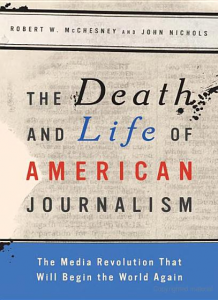Newspapers are doomed, and they basically have themselves to blame for their sorry state of affairs. Perhaps more alarming, however, is the threat failing newspapers pose to journalism in the United States, and the larger threat to democracy.
Robert McChesney and John Nichols lay out the crisis in U.S. media in their book, “The Death and Life of American Journalism: The Media Revolution That Will Begin the World Again,” which was published earlier this year. I’ve discussed parts of the book with my journalism classes at LBCC, along with viewing an interview of the authors on the PBS show “NOW.”
The book nicely sums up how the media, and newspapers in particular, mostly thrived over the past two centuries, becoming one of the most profitable industries on the planet due to its ability to attract unprecedented amounts of advertising.

"The Death and Life of American Journalism" by Robert McChesney and John Nichols.
While newspaper and media companies consolidated their empires and returned enormous profits to shareholders, however, they alienated their customers and sacrificed their journalism. When the economy turned sour and advertising tanked, they accelerated buyouts, layoffs and downsizing newsrooms to maintain profits, further eroding the quality of journalism they delivered.
Piling onto the growing exodus of paying subscribers, the Internet ensured that the next generation of readers is in no mood to pay for information they can get for free. Nevermind the decline of insightful investigative journalism and the media’s role as watchdog and the Fourth Estate.
Although many Americans might be content to see newspapers bite the dust and allow the free market to determine the ways and means by which they receive their news, McChesney and Nichols point out that newspaper newsrooms and the journalists they employ are critical because they provide the bulk of the original reporting that ends up getting shared online and repeated on TV and radio. So if newspaper reporters aren’t covering the news, who will?
It’s that dilemma that threatens democracy. Our Founding Fathers recognized the importance of vibrant journalism to inform citizens. It’s in the First Amendment of the Bill of Rights, after all. As the authors contend, America won’t long survive as a great nation if its citizens become satisfied with only celebrity gossip, public relations and sound bites from their leaders.
I agree with the authors that the free market won’t solve the problem, as more newspaper companies collapse under the weight of their accumulated debt and a failing business model. Their online sites don’t begin to pay the bills and it’s not like the growing community of journalists-turned-bloggers are getting rich or even making a living.
Besides promoting survival of existing media companies, Nichols and McChesney propose a number of other solutions, including:
- Tax credits for companies that maintain or expand their staff of journalists
- Converting media companies into not-for-profit, community-based organizations
- Subsidizing delivery by significantly reducing postal costs for news publications
- Supporting young journalists with a sort of AmeriCorps for new college graduates
- Revitalizing high school journalism programs through education grants
- Expanding funding for public broadcasting, along the lines of Britain’s BBC
The most intriguing idea is what they describe as a “Citizenship News Voucher” program under which each American adult would designate, say, $200 to the non-profit news organization of their choice, or spread their vouchers among several news outlets. The authors suggest this would force news organizations to provide top-quality information in order to attract readers and their vouchers.
“It rewards initiative and punishes sloth,” the authors note. “It is democratic because rich and poor get the same voucher. And the government has no control over who gets the money. It is an enormous public subsidy, but it is a libertarian dream: people can support whatever political viewpoints they prefer or do nothing at all.”
What would it cost if half of U.S. adults exercised such a voucher? Somewhere in the neighborhood of $20 billion a year, a pittance when compared to other aspects of the federal budget. And it would ensure the stated goal – a renewal of vibrant journalism that can serve and engage the American public.
Following Congress these past couple weeks doesn’t make me optimistic that saving journalism stands a chance of getting a hearing anytime soon, though Nichols and McChesney cite several senators and representatives who recognize the crisis and have proposed legislation that might move us down this path.
Nevertheless, the authors make a compelling case, and offer a range of solutions to our crisis in U.S. journalism. If nothing else, they have raised awareness without resorting to hysteria over “liberal media bias” or the evils of News Corp. and Fox News.
-rp-

